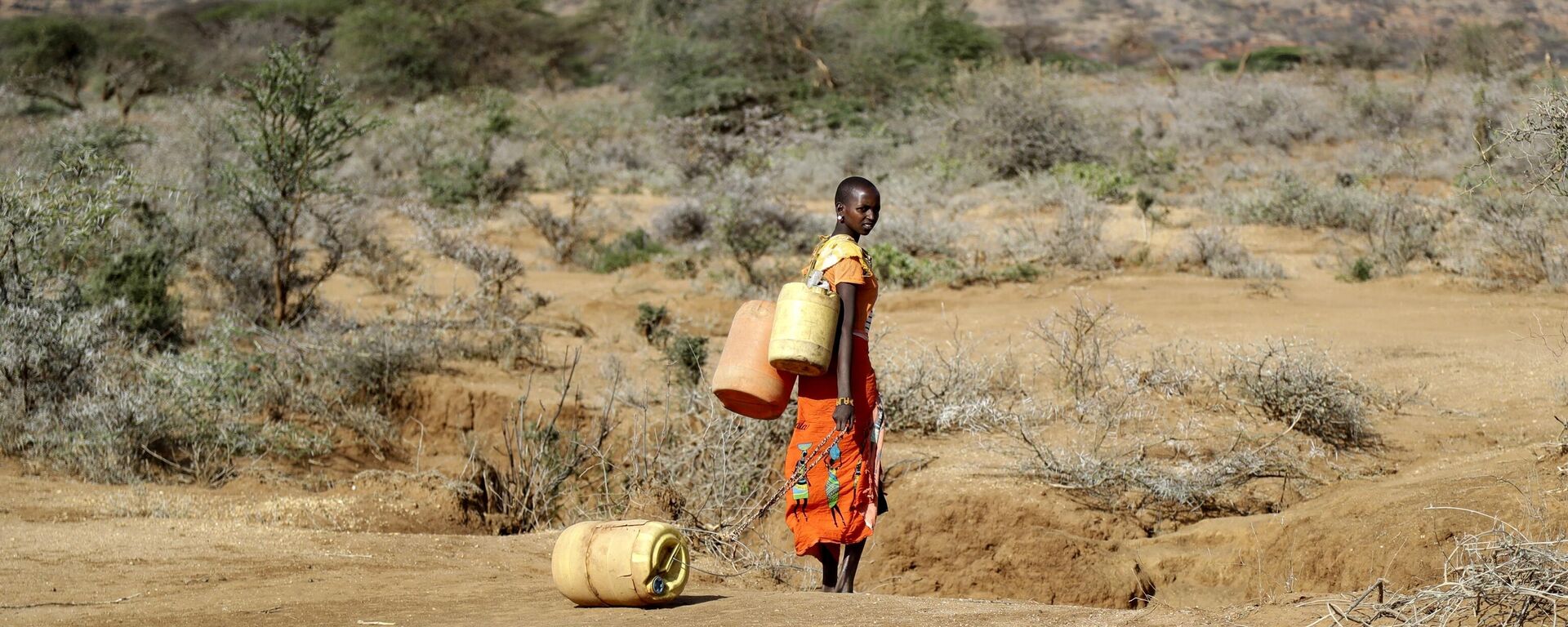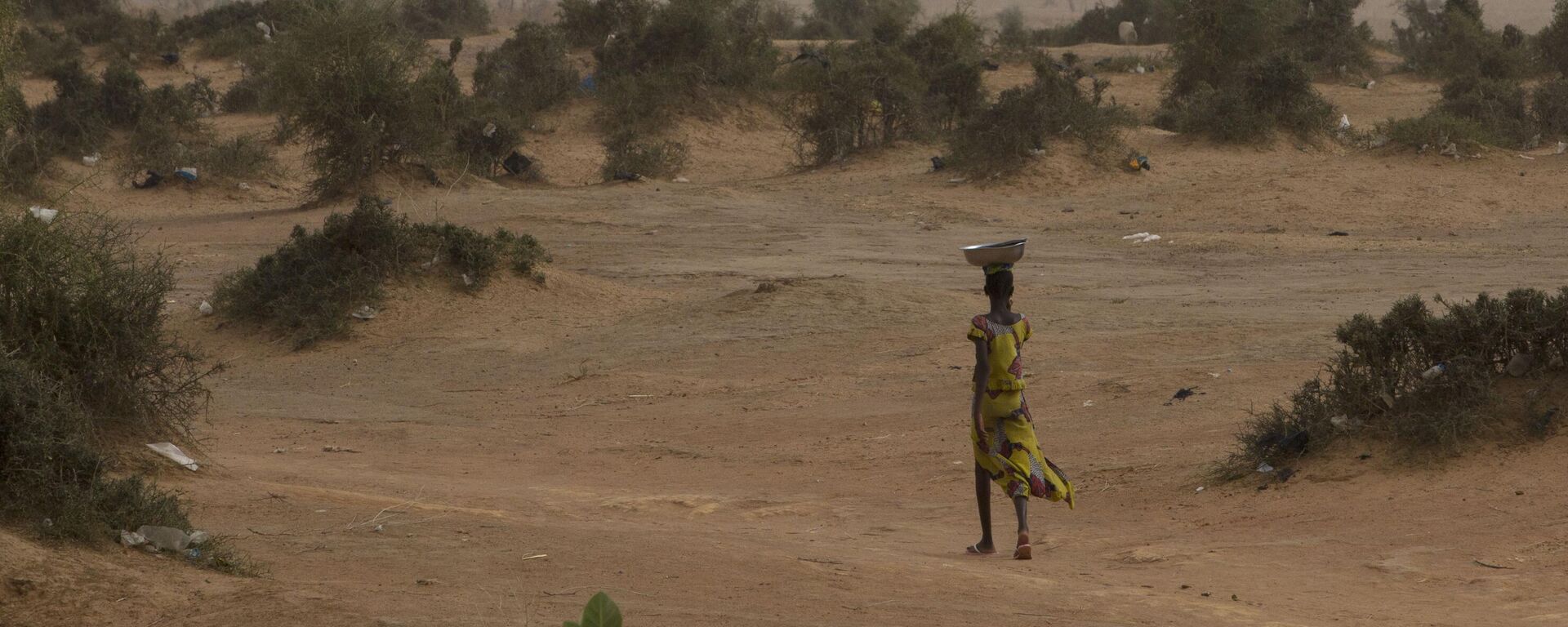https://en.sputniknews.africa/20230718/missed-climate-targets-due-to-toast-central-africa-study-reveals-1060617740.html
Missed Climate Targets Due to Toast Central Africa, Study Reveals
Missed Climate Targets Due to Toast Central Africa, Study Reveals
Sputnik Africa
Climate change is becoming an increasingly important factor in the occurrence of droughts across the world. It is exacerbating the severity and duration of... 18.07.2023, Sputnik Africa
2023-07-18T18:57+0200
2023-07-18T18:57+0200
2023-07-18T18:57+0200
sub-saharan africa
central africa
climate change
climate
united kingdom (uk)
science
https://cdn1.img.sputniknews.africa/img/07e7/07/12/1060615701_0:161:3070:1888_1920x0_80_0_0_5e84b0829b46a492354c9884a3de404f.jpg
Countries located in Central Africa's Sub-Saharan region will likely be hit the most by extreme temperatures if global climate targets are missed, according to a new study conducted by researchers from the Oxford Martin Programme on the Future of Cooling.The researchers showed the impact on global cooling demand in moving from the targeted 1.5 °C to 2.0 °C of global warming, highlighting the need for immediate adaptation interventions across the globe "to be prepared for a hotter world."They used the concept of cooling degree days, a measure of how hot the temperature was on a given day or during a period of days, widely used to examine warming and quantify cooling demand. The latter means the rising need for cooling interventions, such as window shutters, ventilation, fans or air conditioning.The analysis revealed that ten African countries, which mainly align in a west–east band in Central Africa, are among those nations where human exposure to hotter weather will be the most severe. It was noted that these countries have experienced the highest extreme heat historically. Such countries as the Central African Republic, Burkina Faso and Mali are expected to suffer the highest increase in extreme temperatures if the global mean temperatures rise from 1.5 °C to 2.0 °C. The scientists went on to say that extreme heat can lead to dehydration, heat exhaustion and even death, especially among vulnerable groups of people. The world's poorest nations in Africa appeared to be the most vulnerable to the effects of climate change.In addition, other countries that are not traditionally prepared for increased heat will also be severely affected by rising temperatures if climate targets are not met, according to the study. In particular, Switzerland, the UK and Norway will also see an increase in the number of days requiring cooling interventions, if the world exceeds 1.5 °C of warming.
https://en.sputniknews.africa/20230428/climate-change-made-exceptional-drought-in-horn-of-africa-even-worse-study-reveals--1058908168.html
https://en.sputniknews.africa/20230308/1058907577.html
central africa
united kingdom (uk)
Sputnik Africa
feedback@sputniknews.com
+74956456601
MIA „Rossiya Segodnya“
2023
News
en_EN
Sputnik Africa
feedback@sputniknews.com
+74956456601
MIA „Rossiya Segodnya“
Sputnik Africa
feedback@sputniknews.com
+74956456601
MIA „Rossiya Segodnya“
central africa, climate change, climate, united kingdom (uk), science
central africa, climate change, climate, united kingdom (uk), science
Missed Climate Targets Due to Toast Central Africa, Study Reveals
Climate change is becoming an increasingly important factor in the occurrence of droughts across the world. It is exacerbating the severity and duration of droughts in many regions, with Africa being one of the hardest-hit areas.
Countries located in Central Africa's Sub-Saharan region will likely be hit the most by extreme temperatures if global climate targets are missed, according to a new
study conducted by researchers from the Oxford Martin Programme on the Future of Cooling.
The study projected the impact of rising temperatures on cooling adaptation needs on a country-by-country basis under three global warming scenarios: historical (2006-2016), 1.5 °C, and 2 °C.
The researchers showed the impact on global cooling demand in moving from the targeted 1.5 °C to 2.0 °C of global warming, highlighting the need for immediate
adaptation interventions across the globe "to be prepared for a hotter world."
They used the concept of cooling degree days, a measure of how hot the temperature was on a given day or during a period of days, widely used to examine warming and quantify cooling demand. The latter means the rising need for cooling interventions, such as window shutters, ventilation, fans or air conditioning.
"Limiting global mean temperature rise to 1.5 °C is increasingly out of reach [...]. African countries have the highest increase in cooling requirements," read the study.
The analysis revealed that ten African countries, which mainly align in a west–east band in Central Africa, are among those nations where human exposure to hotter weather will be the most
severe. It was noted that these countries have experienced the highest extreme heat historically.
"African countries will experience the highest increase in cooling demand. These conditions will pose further stress to the continent’s socio-economic development and energy networks, and their implications for equitable access to cooling [...]," the researchers said.
Such countries as the Central African Republic, Burkina Faso and Mali are expected to suffer the highest increase in extreme temperatures if the global mean temperatures rise from 1.5 °C to 2.0 °C.
The scientists went on to say that extreme heat can lead to dehydration, heat exhaustion and even death, especially among vulnerable groups of people. The world's poorest nations in Africa appeared to be the most vulnerable to the effects of climate change.
"It is also a clear indication that Africa is bearing the brunt of a problem they did not create, which should further strengthen calls for climate justice and equity," concluded Radhika Khosla, associate professor at the Smith School of Enterprise and the Environment and leader of the Oxford Martin Programme on the Future of Cooling.
In addition,
other countries that are not traditionally prepared for increased heat will also be severely affected by rising temperatures if climate targets are not met, according to the study. In particular, Switzerland, the UK and Norway will also see an increase in the number of days requiring cooling interventions, if the world exceeds 1.5 °C of warming.



